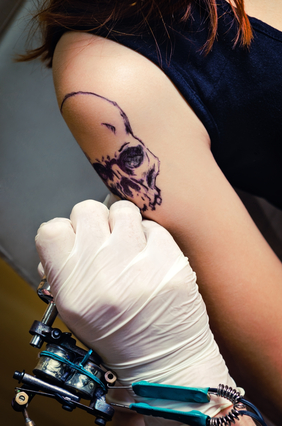by Dr. Craig A. Maxwell
It is estimated that 45 million people in the United States, including 36 percent of adults in their 20s, have at least one tattoo. Getting a tattoo is a rite of passage for many; perhaps a way to symbolize independence, adulthood, or rebellion. People choose to get tattoos to signify a special event in their lives such as a milestone birthday, relationship, or graduation. Among the most popular tattoos are tribal symbols, butterflies, and stars.
You may have seen the show, “Bad Ink” where regretful individuals share the woeful stories of how they got the embarrassing tattoos they now want covered up. In the medical community, the term ‘bad ink’ can mean something else. You may have never thought about it before, but there are some tattoo health risks you need to be aware of before going under the needle.
Tattoo Health Risks You Should Consider Before Getting Inked
1. Infection
If the tattoo parlor you’re going to does not effectively sterilize their equipment, you could run the risk of skin infection. If you have lowered or compromised immunity, you should think twice about getting a tattoo as you are at increased risk for serious skin infections such as cellulitis due to MRSA (Methicillin-Resistant Staphylococcus aureus).
2. Communicable Diseases
All tattoo parlors should use new needles or properly sterilize (by autoclave) the ones they use before tattooing the next customer. Although no case of HIV infection has been directly linked to tattooing, transmission is still possible. Cases of hepatitis B and C have been linked to tattoos.
3. Allergic Reaction
An allergy to tattoo ink could cause a rash, itching, swelling, or blistering. With proper care, this reaction often subsides within one or two weeks. Sometimes, however, there can be a delayed reaction. For example, a 54-year-old British man developed a severe allergic reaction to a tattoo he got 20 years earlier due to chemotherapy treatment and a weakened immune system.
4. Photosensitivity
Cadmium sulfide, a heavy metal byproduct of some tattoo dyes can cause swelling or burning of the tattooed skin when exposed to UV light or an MRI.[1. http://www.ncbi.nlm.nih.gov/pubmed/23350817]
5. Heavy Metal Toxicity
Many standard tattoo inks contain a variety of heavy metals including cadmium, iron oxide, lead, antimony, beryllium, chromium, cobalt nickel, and arsenic. Exposure to these chemicals can increase your risk for central nervous system damage, depression, anxiety, autoimmune disease, and even cancer.
6. Fertility Problems
Some tattoo inks also contain endocrine disruptors such as phthalates, which may cause fertility problems in both men and women. Studies have shown that phthalate exposure in men can interfere with how testosterone is made and may lead to damaged sperm and lower sperm quality.[2. http://www.ncbi.nlm.nih.gov/pubmed/24534276] Women exposed to high levels of phthalates showed a higher implantation failure when undergoing IVF treatments than women exposed to minimal amounts.
7. Cancer
Nanotechnology is the manipulation of atoms and molecules into complex molecular machines. These particles are on a scale so small, they cannot be measured with a light microscope.
It may surprise you to know that black tattoo ink is comprised almost exclusively of nanotechnology. These particles pass through your skin and mucous membranes easily and are able to evade your immune and detoxifying systems.
If toxic tattoo ink is allowed to migrate to your lymph nodes and vital organs, it may make you more vulnerable to the development of cancer.
Furthermore, a tattoo placed in just the right area may cover up a mole that is turning cancerous, making it more difficult to spot and treat.
Becoming infected with hepatitis B, hepatitis C, or HIV greatly increases the cancer risk associated with these diseases.
The decision to get a tattoo is ultimately up to you. Always take into account your current state of health, the artist and parlor, the tattoo ink that will be used, and the amount of time you’re willing to invest in aftercare.
It could mean the difference between a piece of art you’re proud to show off and a regret that lasts a lifetime.
Energy Drinks Can be Harmful to Your Health
Read Next:








